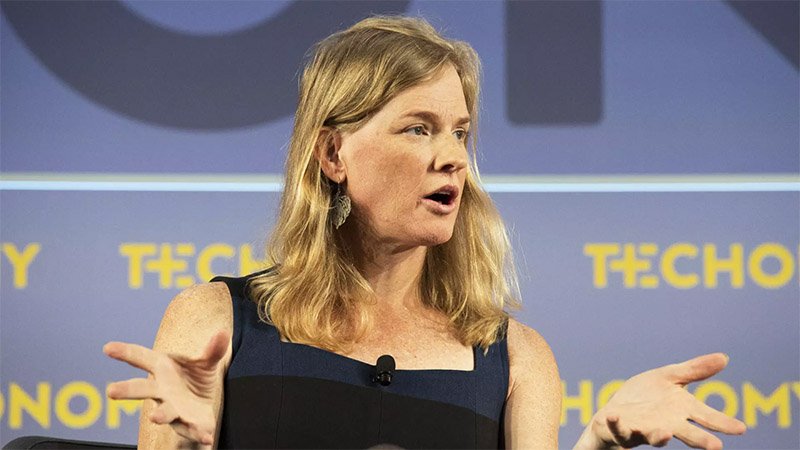Is innovation slowing down? Vivienne Ming, a speaker at our upcoming Techonomy 2022 conference this November in Sonoma, has data that says the answer is yes. Her explanation? “Information has become too cheap,” this neuroscientist and innovation expert says. “The faster information flows, the slower innovation goes.” That’s because, her research has shown, as search and information gathering online becomes more efficient and seemingly productive, people are too-quickly satisfied with their results. They give up searching––and thus innovating.
The theme for Techonomy 2022 is “Innovation Must Save the World.” We may be tech optimists, but we are gravely worried about the state of society and the planet. Even as progress continues along many vectors, the challenges of global warming and human inequality threaten every sort of progress. Those crises must be addressed, and quickly. Meanwhile, geopolitical conflict and tension is growing, just when the world most badly needs to come together to collectively address its common problems.

Democracy is teetering. That’s a key reason our opening speaker is Maria Ressa, winner of the 2021 Nobel Peace Prize and a brave crusading journalist. In her country, the Philippines, government has methodically sought to suppress criticism and distort democracy. Ressa currently faces numerous criminal charges just for doing her job.
Innovation around climate is a key theme of the Sonoma event, with climate entrepreneurs, investors, and experts. We hosted two powerful related smaller conferences already this year. Techonomy Climate in March brought Silicon Valley leaders together with activists to discuss climate tech and climate action. And September’s Health+Wealth of Our Planet event during Climate Week in New York focused on the urgency of action for business.
Mike Schroepfer hasn’t spoken much in public lately, but he will tell us why his new passion, as a private investor, is climate tech, after a decade as CTO of Facebook.
Edward Shenderovich is another longtime technologist now relentlessly focusing on climate-related innovation. His new company Synonym is creating a platform to improve and simplify biofabrication of molecules of diverse sorts. Many of them replace materials otherwise obtained through fossil fuel or agricultural processes.

If we could get off milk and meat, for example, the U.S. could reduce its greenhouse-gas emissions as much as 30%, by some estimates. Cows belch that much. Here’s what Shenderovich told us this week on a prep call: “We want to build the infrastructure so biotech and synthetic biology companies that are working in food, materials, and energy can benefit from the same type of common infrastructure that internet companies benefitted from.” He says synthetic biology and biofabrication is at about the same maturity as the internet industry in the mid-1990s. It desperately needs efficiencies that come with industrial infrastructure.
But no matter how much progress rich countries like the U.S. make in reducing emissions, poorer countries must continue to grow. That’s a matter of simple justice, as billions strive to enter a middle-class economy. Yet they must learn to operate much more efficiently than we did on our way up. This is exactly the kind of thing that our speaker Fatoumata Ba is expert in. The Senegalese entrepreneur and investor scored big in an earlier e-commerce company, and now invests in other African entrepreneurs, many of them women like herself, in diverse industries. All are driving digital efficiency that saves energy and emissions.
So we see climate action, development, and innovation as inextricably related. But this conference will examine prospects for innovation in numerous other ways, as well as appraising some of the world’s problems that demand such innovation. Larry Brilliant, the well-named doctor and epidemiologist who fought smallpox and built Google.org, has now become a top expert on the Covid pandemic. His immersion in the world of Silicon Valley gives him a hugely helpful view of how we must act in this pandemic-transformed world.
We’ll explore other themes, too, like the future of media, gaming, and the prospective metaverse. We’ll host Activate’s Michael Wolf, one of the world’s most sage media analysts, who will outline what he sees coming; Jeffrey Katzenberg, founder of Dreamworks Animation and serial entrepreneur and investor; Unity CEO John Riccitiello; Games For Change President Susanna Pollack, and Autodesk CEO Andrew Anagnost. Robotics will be another theme, with CEO Tekedra Mawakana of Alphabet/Google’s self-driving car division Waymo along with Ken Washington, who oversees Amazon’s robotics engineering.
And a powerful session will examine Ming’s views about information and innovation as well as John Hagel’s thinking about the role of fear in business, and Esther Dyson’s thinking about addiction. Are VCs and entrepreneurs addicted to a certain form of company formation and exit? Dyson’s decades of immersive involvement with tech companies and now engaging with health and wellness challenges across disadvantaged regions of the U.S. gives her a unique vantage.
That’s all of the cornucopia I can fit in this article, but if you look at the event site you can learn more, and register your interest in joining us!
To see what our annual retreat is like look at these videos here.
















